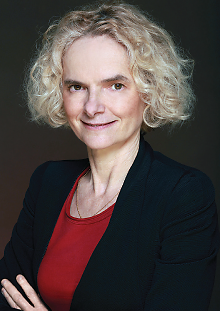Volkow to Give Keynote Lecture at Toronto Annual Meeting
Abstract
Nora Volkow, M.D., whose research has advanced the knowledge of addictions by showing that they are brain disorders, will discuss the neurobiology of substance abuse disorders.
Renowned addictions researcher Nora Volkow, M.D., director of the National Institute on Drug Abuse, will present the William C. Menninger Memorial Convocation Lecture at APA’s 2015 annual meeting next month in Toronto.

National Institute on Drug Abuse Director Nora Volkow, M.D., says that she is pleased that APA is putting a spotlight on substance use disorders at one of the most visible annual meeting sessions.
She will present the lecture during the Convocation of Distinguished Fellows, which will be held Monday, May 18, at 5:30 p.m. in Exhibit Hall A, Level 300, in the North Building of the Toronto Convention Centre.
“I was very excited when I got the invitation,” Volkow told Psychiatric News. “It shows that there is a great sensitivity at APA for recognizing substance use disorders as mental health disorders and that such illnesses must be addressed in those patients who are affected.”
She added, “Though substance use disorders are extremely prevalent as a single entity or with other comorbid mental illnesses, substance use disorders have not received the attention that they deserve. I commend APA for bringing this form of mental illness to the forefront at one of the meeting’s most important sessions.”
A world-famous research psychiatrist, Volkow has been instrumental in demonstrating that substance use disorder (SUD) and other addictions are diseases of the human brain. Through studies involving brain imaging of people who have a drug addiction, she has helped to identify some of the underlying mechanisms of substance use disorders, such as malfunction of dopamine neurocircuitry.
Volkow’s research has also been aimed at changing the public’s view of drug addiction from that of a moral or personal failing to one that promotes an understanding that pathophysiological abnormalities in the brain may make some people more prone to addictive behaviors.
Volkow was born and raised in Mexico City, earned her medical degree from the University of Mexico, and did her psychiatry residency at New York University. She said that she chose a career in neurobiology after reading an article on the use of positron emission tomography in studying brain function. She never imagined that one day she would be invited to present the lecture at the convocation.
“I’ve been going to the annual meeting every year since 1980, when I was a medical student,” said Volkow. “It was an important meeting for me as a trainee, for I was able to learn and educate myself on the latest advancements in psychiatry.”
Volkow stated that as she advanced in her career, the annual meeting provided her with a platform for sharing her knowledge about the underlying factors of substance use disorders not only with practicing psychiatrists but with residents and fellows—“the future of psychiatry.”
Volkow remarked on how far the field of psychiatry has progressed regarding the perception of addiction as a mental illness. “Now the gears are shifting, and APA is putting more focus on getting members to see the importance of understanding every known aspect of addiction and the tools to treat this disorder. This really makes me happy.”
At the convocation, Volkow will give a general perspective on the neurobiology of addiction and substance abuse disorders and how neurocircuitries of addiction can overlap those of other psychiatric conditions such as depression. In addition to her convocation address, Volkow will conduct an interactive session titled “Let’s Talk About Marijuana,” in which the controversial trends in marijuana-related legislation in several states will be discussed, and participate in a media workshop on addiction with National Institute on Alcohol Abuse and Alcoholism Director George Koob, Ph.D. (Psychiatric News, February 19). ■




